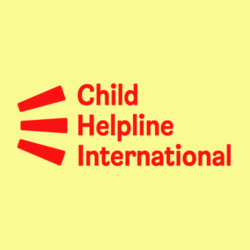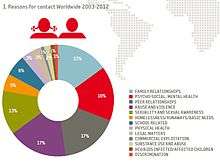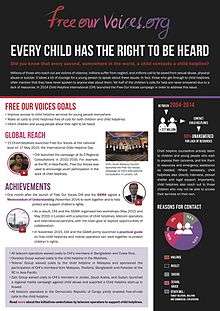Child Helpline International
 | |
| Founded | 2003 |
|---|---|
| Founder | Jeroo Billimoria |
| Type | NGO |
| Location |
|
Area served | Worldwide |
Members | 181 |
| Website |
www |

Child Helpline International is a global network of 181 child helplines in 147 countries (as of May 2017).[1] A child helpline is a telecommunication and outreach service on behalf of children and young people.[2] As of 2017, Child Helpline International is ranked in the top 100 NGOs worldwide by NGO Advisor on measurements including transparency, sustainability and impact.[3]
History
In 1989, Child Helpline International founder Jeroo Billimoria worked closely with street children in India as a social worker. She gave the children her telephone number and told them to call if they needed any help, after which she received a large volume of contacts. Billimoria realised that these children needed someone to speak to and assist them. The idea of a toll-free number emerged and she set up Childline India - India's first and only child helpline.[4]
Childline's approach was to have volunteers who answered the phone and who would go directly to the child in need. All phones available for public use could dial Childline, toll-free, in order to help children find aid in places where an emergency shelter may not be located.[5] The volunteers kept a log of the calls, which became an important source of data for the creation of child protection policies, thus placing these helplines at the centre of child protection policy.
After its success in India, Billimoria explored the idea of taking Childline India's concept globally with hopes to create a global network which provided technical assistance to countries who could start or expand their own helplines.
This led to the 2003 International Consultation Meeting, held in Amsterdam and attended by representatives from 49 child helplines from around the globe, (including members of European helplines who had previously attempted to form a collaboration). At this meeting, Child Helpline International was launched.[6]
Principle and Mission
The work of Child Helpline International is firmly grounded in the principle of United Nations Convention on the Rights of the Child (UNCRC), which highlights the children's rights to privacy and protection from harm.[7]

The stated mission of the Child Helpline International network is to provide a forum for information sharing and mutual support, assistance with advocacy and lobbying, promoting the rights of children and child helplines as a medium of assistance to children, and to support the initiation and development of child helplines in countries which do not have such services.[8]
Operations
Child Helpline International is based in Amsterdam, Netherlands. The Executive Director of Child Helpline International is Sheila Donovan. Child Helpline International is a membership-based organization with members from five regions: Africa, Americas and The Caribbean, Asia Pacific, Europe, and Middle East and North Africa. In 2015, Child Helpline International reached over 20 million contacts from children and young people in need for care and protection.[9][10]
Free Our Voices Campaign
In 2014, Child Helpline International launched the Free Our Voices Campaign, an interactive digital petition created in collaboration with designers MPC Creative and The Kennedys.[11] The aim, in the words of MPC, is "to use the power of the collective voice-signatures to raise awareness and help CHI get the support needed from governments, corporations, and telecoms to ensure every child’s call for help is answered".[12]
The website uses sound recognition technology which allows visitors to sign the petition by verbally recording their name. Each recording is then visualised by a unique written signature determined by the frequency, sound, rhythm and speech pattern of each participant’s individual voice. Signatures can be further personalised with colour patterns and are easily shareable via social channels. All signatures are rendered in real-time and captured in a 3D gallery in the shape of a young girl’s face. Visitors can explore the gallery to view their own signature and search names of other participants.[13] This unique design won MPC Creative the 2015 Brand Republic Digital Awards, which recognises those at the forefront of the international communications industry.[14]
Notable successes of the Free Our Voices Campaign included a collaboration between Child Helpline International and the GSMA on producing a guide on how child helplines and mobile operators can work together to protect children's rights, and cost waivers for child helplines in multiple countries including Bangladesh, Democratic Republic of the Congo, Costa Rica, Jordan, Malaysia, Saudi Arabia and Sudan.[15]
Knowledge Exchange Platform
A key role of the network is to provide platform for knowledge transfers between the members.[16] Types of knowledge exchange activities are:
- Peer Exchanges: Members of the network learn from one another through visits, sharing solutions, comparing expertise and experiences.
- Peer Evaluations: Member organizations compare and evaluate good practices, governance and operations of their own child helplines with other members.
- Trainings and Workshops: Member organizations learn from trainings and workshops to make sure that each child helpline stay abreast of changing times and needs and possess the up-to-date skills
- International and Regional Consultations: International and Regional Consultations are biennial events held in alternating years in which the members, partners, and stakeholders come together to find common ground, report and reflect on collective experiences from the existing child helplines.
References
- ↑ "Child helplines Archive - Child Helpline International". Child Helpline International. Retrieved 2017-05-23.
- ↑ "CHI - Child Helpline International". www.childhelplineinternational.org. Retrieved 2017-01-24.
- ↑ "CHILD HELPLINE INTERNATIONAL • NGO Advisor". NGO Advisor. Retrieved 2017-01-24.
- ↑ "1098 Section of Childline India Foundation Website". www.childlineindia.org.in. Retrieved 2017-01-24.
- ↑ Bornstein, David (2007). How to Change the World: Social Entrepreneurs and the Power of New Ideas. New York: Oxford University Press. p. 82. ISBN 0195138058.
- ↑ "CHI - Child Helpline International".
- ↑ "Convention on the Rights of the Child". www.ohchr.org. Retrieved 2017-01-24.
- ↑ "CHI - Child Helpline International".
- ↑ "Voices of Children: 2015 Global Highlights - Child Helpline International". Child Helpline International. 2017-05-15. Retrieved 2017-05-23.
- ↑ Buljanovic, K. & Prasad, R. R.(November 2013)"The Voices of Children and Young People." Child Helpline International 10th year anniversary publications. p.1
- ↑ Child Helpline International (2014-10-29), Free Our Voices Launch Film, retrieved 2017-02-08
- ↑ "Child Helpline International (CHI), FREE OUR VOICES". mpc-15.moving-picture.com. Retrieved 2017-02-08.
- ↑ "Stand for every child's right to be heard". freeourvoices.org. Retrieved 2017-02-08.
- ↑ "MPC Creative win at Brand Republic Digital Awards for Innovative 'Free Our Voices' campaign". mpc-15.moving-picture.com. Retrieved 2017-02-08.
- ↑ "Child Helpline International - Free Our Voices | Facebook". www.facebook.com. Retrieved 2017-02-08.
- ↑ "CHI - Child Helpline International". www.childhelplineinternational.org. Retrieved 2017-01-24.
External links
- Official website

- Child Helpline International Annual Report 2015
- https://www.ashoka.org/fellow/Jeroo-Billimoria
- NGO Advisor